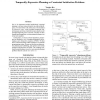Free Online Productivity Tools
i2Speak
i2Symbol
i2OCR
iTex2Img
iWeb2Print
iWeb2Shot
i2Type
iPdf2Split
iPdf2Merge
i2Bopomofo
i2Arabic
i2Style
i2Image
i2PDF
iLatex2Rtf
Sci2ools
AIPS
2007
2007
Temporally-Expressive Planning as Constraint Satisfaction Problems
Due to its important practical applications, temporal planning is of great research interest in artificial intelligence. Yet most of the work in this area so far is limited in at least two ways: it only considers temporally simple domains and it has restricted decision epochs as the potential happening time of actions. Because of these simplifying assumptions, existing temporal planners are in fact not complete. In this paper, we focus on these limitations, and propose an alternative view of temporal planning by investigating a new declarative semantics of PDDL. We then show a natural encoding of this semantics in a constraint programming setting. It turns out that this encoding unifies planning and scheduling, and captures most of the temporal expressiveness of PDDL. The resulting CSPbased temporal planner can solve more general planning problems than the current state-of-the-art.
AIPS 2007 | Artificial Intelligence | CSPbased Temporal Planner | Temporal Planner | Temporal Planning |
| Added | 02 Oct 2010 |
| Updated | 02 Oct 2010 |
| Type | Conference |
| Year | 2007 |
| Where | AIPS |
| Authors | Yuxiao Hu |
Comments (0)

